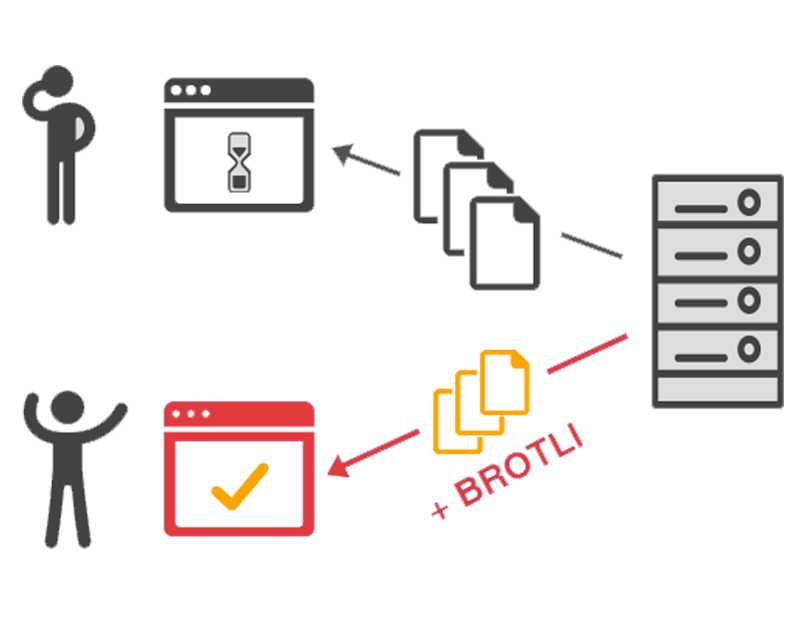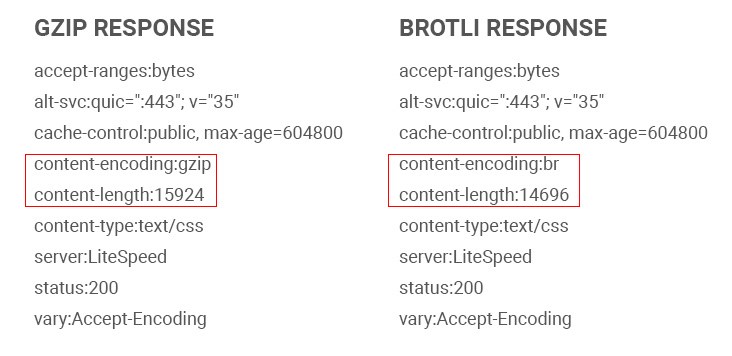What is BROTLI?
What are the advantages?
Your big files are smaller with Brotli and your sites are faster!
WHAT IS BROTLI?
Brotli is a new open source compression algorithm developed by Jyrki Alakuijala and Zoltán Szabadka designed to provide users with fast Internet access. It is an attractive algorithm because reducing file sizes will help make the web a faster and more enjoyable place for users; this is especially true for mobile users. By compressing the files on your site to a certain level, it provides faster opening of your site and balancing bandwidth load.
Brotli was first released in 2015 for offline compression of web fonts, and most web browsers have recently adapted it. Brotli, released in September 2015 by Google software engineers, included improvements in lossless data compression in general, with emphasis on HTTP compression in particular. The encoder was partially rewritten, resulting in both the encoder and decoder being accelerated as the compression ratio increased, the flow API improved, and more compression quality levels added. In addition, the new version demonstrates performance improvements across platforms with memory reduction decoding.
Contemporary web pages consist of dozens of megabytes, mostly HTML, CSS and JavaScript, and this is just before images, videos and other large file content that requires heavy downloads. Such downloads explain why pages are transmitted in compressed formats, which significantly increases the time between the website visitor requesting a web page and the page being fully loaded and ready for use.
However, based on a compression algorithm study conducted at Google, Brotli outpaced significantly faster with a 20-26% increase in compression compared to Zopli. Higher data density is achieved through 2nd order context modeling, re-use of entropy codes, larger memory window of historical data, and common distribution codes.
BROTLI Compression method
Brotli is based on a modern LZ77 algorithm, Huffman coding and 2nd order context modeling. Compression has come a long way in the last few years and Brotli is in the foreground in this category. Especially if you have a site that consumes a lot of traffic periodically; Brotli compression will really ease you. Here are some of the main events that make Brotli a leader:
- By balancing traffic, it will prevent excessive traffic consumption.
- By compressing the files on your site, it will allow your site to open faster.
- Brotli is independent of CPU type, operating system, file system and character set.
- It can produce a compression ratio that is comparable to the best compression methods currently available, and most importantly it can produce a much better compression ratio than gzip. The Brotli algorithm provides a compression gain of 17% to 25% of files such as css, html, js compared to Gzip.
- It opens much faster than the current LZMA application.
- In mobile devices, decompressing (decompressing) will have a positive effect on charging and speed performance as the processor costs will be less.
Unlike most general-purpose compression algorithms, Brotli uses a predefined 120 kilobyte dictionary in addition to its dynamically populated (“sliding window”) dictionary. The predefined dictionary contains over 13,000 common words, sentences and other sub-strings derived from a large korf of text and HTML documents. Using a predefined dictionary has been shown to increase the compression in which a file contains frequently used words.
As Software Engineer Zoltan Szabadka at Google’s Compression Team said,
“We hope that this format will be supported by large browsers in the near future, because the benefits of smaller compressed size, lower data transfer rates and reduced battery usage will give mobile users additional benefits.”
The content of Brotli-compressed streams has a “br” encoding type. (To give an additional note, the originally proposed “bro” plugin was rejected because it had too much verbal load for its intended use in American English. However, calling “br” instead of “bro” gave everyone a byte. it was.
Web server Support
Brotli compatible servers and modules
- Apache HTTP Server has been using mod_brotli since 2.4.26.
- Microsoft IIS has no official support or application commitment. There is a community module that adds support.
- Nginx has no official support or application commitment. A ngx_brotli module is available from Google Inc. provided by.
- Node.js does not have official support, but I have a community module shrink-ray that adds support.


Web Browser Support
Browsers that support Brotli
Google Chrome has supported Brotli since version 49.
Microsoft Edge has been supporting Brotli since version 15.
Mozilla Firefox implemented Brotli in version 44.
Opera has been supporting Brotli since version 36.
Safari has been supporting Brotli since version 11.
Status of BROTLI
- Since the font compression type is widely used as WOFF2, Brotli has already found support (as font compression) among many browsers.
- Both Chrome and Firefox may use Brotli as a general data compression method in some cases.
- The new release focuses on using Brotli as a general http compression method as an alternative to gzip / deflate / Zopfli.
- To take advantage of the smaller file sizes offered by Brotli, both the server and the client must be Brotli-compliant.
- There is currently no server that supports Brotli out of the box as a general data compression method, but there are methods to do so.


In fact, the speed advantage of using Brotli may not always make the user feel. At the same time, the development of a completely new open-source compression algorithm is not common, which puts it in a position to appreciate.
To find out more, Cloudflare’s engineers provide details about Brotli’s comparison with other algorithms. Together with the discovery full of knowledge, the engineers convey the fascinating potential of Brotli’s improved compression method in real life application.
Mobile support:
Low battery usage due to less data transfer and less CPU usage for mobile users
Security
HTTPS protocol provides secure communication.
A New Protocol
It is a new compression algorithm developed by Google.





